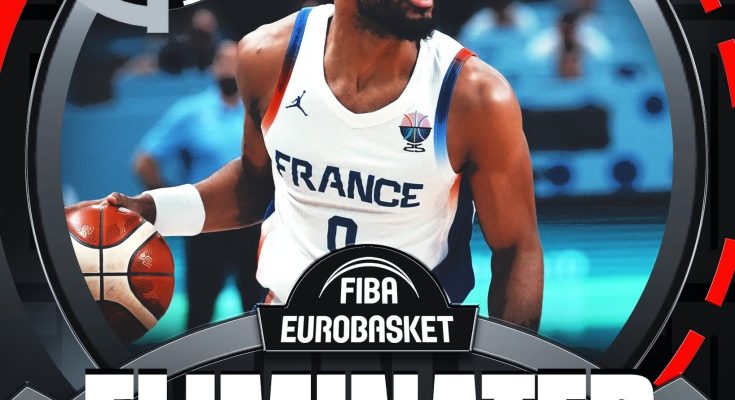The world of international basketball has seen its fair share of surprises and upsets, but few results have been as striking as France’s early exit in the Round of 16 at the latest EuroBasket tournament. Just a short while ago, the French national team stood on the podium at the Olympics, proudly holding up their silver medals, a testament to their skill, teamwork, and determination. Yet, despite the momentum carried over from such a prestigious achievement, their journey in EuroBasket ended abruptly, raising questions about what went wrong, what this means for French basketball, and how the dynamics of European basketball might be shifting.
At the Tokyo 2020 Olympics, held in 2021 due to the pandemic, France’s basketball team captured the imagination of fans worldwide. They played with an incredible blend of experience and youthful energy, boasting stars like Rudy Gobert, Evan Fournier, and Nicolas Batum, alongside rising talents such as Victor Wembanyama, who has been heralded as one of the most promising prospects in the basketball world. Their path to the silver medal was marked by impressive performances against some of the best basketball nations, including the USA, Australia, and Slovenia. The silver medal wasn’t just a symbol of their talent; it was proof of a team that had matured into a serious contender on the global stage.
However, the EuroBasket tournament that followed painted a very different picture. Traditionally, EuroBasket has been a fiercely competitive battleground where the best European teams test their mettle. For France, expectations were sky-high given their recent Olympic success. But basketball is a sport where momentum and context can change rapidly. The French team’s failure to advance beyond the Round of 16 was not only disappointing but also bewildering for fans and analysts alike. It brought to light several underlying issues that perhaps hadn’t been as apparent during their Olympic campaign.
One of the biggest factors contributing to France’s early exit was the challenge of roster continuity and player availability. The Olympics had seen a nearly full-strength French squad, but EuroBasket presented a different scenario. Several key players were either unavailable due to injuries, NBA commitments, or personal reasons. This lack of continuity disrupted the chemistry and flow the team had built during the Olympics. Basketball at this level demands cohesion, understanding, and rhythm among teammates—qualities that can take years to develop. The absence of veteran leaders or crucial contributors inevitably weakens the team dynamic.
Moreover, EuroBasket features a highly competitive field where the margins between victory and defeat are razor-thin. Teams like Spain, Serbia, Lithuania, and Greece come prepared with deep rosters and tactical sophistication. For France, facing such adversaries without their full complement of players meant they had to rely more heavily on less experienced players, who, despite their talents, were still adapting to the intensity and pressure of major international tournaments. The youthful players showed flashes of brilliance but lacked the consistent execution needed in critical moments.
Another aspect that cannot be overlooked is the tactical approach employed by the French coaching staff. While their strategies had been successful in the Olympics, the dynamics of EuroBasket are somewhat different. The tournament’s format, the style of play favored by European teams, and the short turnaround times between games all demand adaptability and strategic finesse. It appeared that France’s game plan was somewhat rigid and failed to adjust adequately to the different challenges posed by their opponents. The coaching staff’s inability to tweak their tactics during games or series cost them dearly in crucial matches.
Additionally, the psychological impact of entering EuroBasket as the “silver medalists” from the Olympics might have played a subtle role. Expectations often translate into pressure, and pressure can sometimes inhibit performance rather than enhance it. The French players might have felt the burden of proving their Olympic success was not a one-time event, leading to a conservative style of play or hesitation in key moments. Basketball at the highest level is as much a mental game as it is physical, and the psychological strain of carrying a nation’s hopes can influence decision-making and execution.
It’s also important to highlight the rise of competition within European basketball. EuroBasket has evolved over the years, with many nations investing heavily in their basketball programs, developing grassroots talent, and embracing modern training methods. Countries that were once considered underdogs have now become formidable opponents. This increase in parity means that traditional powerhouses like France can no longer rely solely on reputation or past successes. Every game is a challenge, and upsets are increasingly common.
The French basketball federation will likely undertake a thorough review of the team’s preparation, selection process, and strategic approach in response to this disappointing outcome. The silver medal at the Olympics shows that the foundation of French basketball is strong, but EuroBasket has exposed areas needing improvement. These might include better player management to ensure availability during major tournaments, enhanced tactical flexibility, and perhaps a renewed focus on mental conditioning to help players cope with high expectations.
Looking ahead, the French national team’s setback at EuroBasket could serve as a valuable learning experience. Basketball is cyclical; teams rise and fall, adapt and evolve. The key is to extract lessons from defeats, rebuild with intention, and come back stronger. The silver medal from the Olympics is proof that France has the talent and the potential to compete with the best. What remains to be seen is how they harness that potential in future competitions, including the FIBA World Cup and the next Olympic cycle.
The broader implications of France’s exit also speak to the shifting landscape of international basketball. European basketball is becoming more dynamic and unpredictable. Nations that previously hovered in the shadows are now capable of toppling giants, thanks to improved coaching, talent development, and international exposure. This democratization of success makes tournaments like EuroBasket more exciting and less predictable, but also more challenging for established teams.
For fans, the early departure of France from EuroBasket might be a disappointment, but it should not diminish their enthusiasm for the sport or the team. French basketball has a rich history and a passionate following. The rise of new talents and the return of experienced stars will ensure that France remains a key player on the international stage. The sport’s growing popularity within France, supported by a strong domestic league and investment in youth programs, promises a bright future.
In essence, France’s journey from Olympic silver medalists to an early exit at EuroBasket encapsulates the highs and lows of competitive sports. It underscores the importance of consistency, adaptability, and mental fortitude in sustaining success. While the silver medals reflect the team’s peak capability, the EuroBasket result serves as a humbling reminder that in basketball, no team can afford complacency. The narrative is far from over. Instead, it marks the beginning of a new chapter where lessons learned will shape the next generation of French basketball stars. The road ahead is challenging, but with the right adjustments, France can once again rise to claim its place among Europe’s elite and perhaps even aim higher on the global stage.



